annual report1-final.qxd - Overseas Indian
annual report1-final.qxd - Overseas Indian
annual report1-final.qxd - Overseas Indian
Create successful ePaper yourself
Turn your PDF publications into a flip-book with our unique Google optimized e-Paper software.
Panel Discussions<br />
Government in making laws. She pointed out that<br />
the established stereotype of <strong>Indian</strong>s as manual<br />
workers had been replaced with the arrival of professionals<br />
in software etc. She, however, felt the<br />
need to fight the prevailing Hindu India stereotype<br />
and the importance of showcasing the diversity.<br />
At this point, Chidanand Rajghatta intervened,<br />
suggesting that this stereotype was now changing.<br />
He referred to the religions of people who were<br />
holding important positions like A.P.J. Abdul<br />
Kalam, Manmohan Singh, and Sonia Gandhi. The<br />
Chairman suggested that television would be used<br />
more effectively to reach out to the diaspora.<br />
Another panelist, Srinath Srinivasan, referred to<br />
the nature of media in the earlier days and the<br />
growth of media in the recent decades. The present<br />
day generation wanted to know more of what was<br />
happening. He also talked about the need for<br />
resources for covering the overseas <strong>Indian</strong> community<br />
in the U.S. through a TV channel.<br />
Ramesh Japra, a publisher, agreed on the need<br />
for a TV channel for networking with the <strong>Indian</strong><br />
diaspora. He stressed on the need to pool resources<br />
for producing quality programmes.<br />
Raju Narisetti called for the creation of a database<br />
on ethnic media. He mentioned the role being<br />
played by SAJA (South Asian Journalists<br />
Association) in encouraging Asian journalists.<br />
Narisetti said that the <strong>Indian</strong> media in different<br />
States catered locally and added that a global effort<br />
was not a viable proposition. This was because of the<br />
diversity in the diaspora. Though <strong>Indian</strong> heritage<br />
was a binding point, it was difficult to bridge the gap.<br />
Rajghatta mentioned instances where achievements<br />
of <strong>Indian</strong>s abroad (like Yella Pragada Subba Rao, who<br />
discovered tetracycline) were not reported in the<br />
media. He talked about different streams of diaspora in<br />
terms of indentured labour, the Gulf diaspora of the<br />
Seventies, and the professional diaspora of the recent<br />
decades. He felt that there was scope for networking<br />
and the PIOs were rediscovering India these days. He<br />
visualised a future, where the Pravasi Bharatiya Divas<br />
could be held in cyber space and not in any location.<br />
Paras Ramoutar recalled those days in Trinidad<br />
where there was limited coverage of the diaspora in<br />
the media. The situation has changed now with explosion<br />
of channels. He pointed to the negative projection<br />
of <strong>Indian</strong>s in the Western media. While highlighting<br />
the new generation and new trends, he stressed on the<br />
need to project success stories to unite the diaspora.<br />
Several participants expressed their views on the possibility<br />
of starting a TV network and global newspaper<br />
for the diaspora, having both global and region-specific<br />
coverage. The potential of the media as a political and<br />
economic tool was highlighted. The example mentioned<br />
was the coverage of the previous Pravasi<br />
Bharatiya Divas on BBC. Others mentioned the positive<br />
role played by India Abroad magazine. The members<br />
pointed out that India should not think of the diaspora<br />
as one block, whereas for the diaspora, India was one.<br />
There was a broad consensus among participants on<br />
the need for networking, to create a global federation<br />
of <strong>Indian</strong> journalists, to dispel the negative stereotype<br />
and to project positive aspects and success stories.<br />
Panel Discussion III: Communal Harmony<br />
and Secularism<br />
Chair:<br />
Oscar Fernandes,<br />
MOS (IC)<br />
Speakers:<br />
Abdul Raouf Bundhun,<br />
Vice-President,<br />
Mauritius<br />
Justice A.M. Ebrahim,<br />
Zimbabwe<br />
Shrikumar Poddar,<br />
U.S.<br />
George Abraham,<br />
Founder, National<br />
Coordinator of<br />
NRIs for Secular<br />
and Harmonious<br />
India, U.S.<br />
Nirmala Deshpande,<br />
Member, Rajya Sabha<br />
The session was chaired by Oscar Fernandes,<br />
Minister of State for <strong>Overseas</strong> <strong>Indian</strong> Affairs. In his<br />
welcome address, he stressed on the significance of<br />
communal harmony in a multi-linguistic and<br />
multi-religious nation like India.<br />
The first speaker, Abdul Raouf Bundhun, Vice-<br />
President of Mauritius, stressed on the need to unify<br />
44







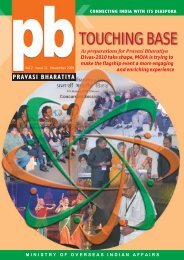
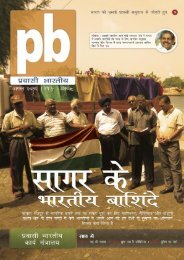

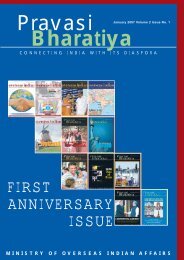
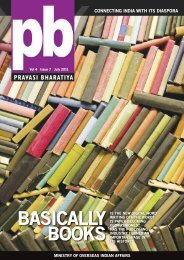
![flaxkiqj feuh izoklh Hkkjrh; fnol] vDVwcj 9&11 - Overseas Indian](https://img.yumpu.com/43977040/1/184x260/flaxkiqj-feuh-izoklh-hkkjrh-fnol-vdvwcj-911-overseas-indian.jpg?quality=85)
